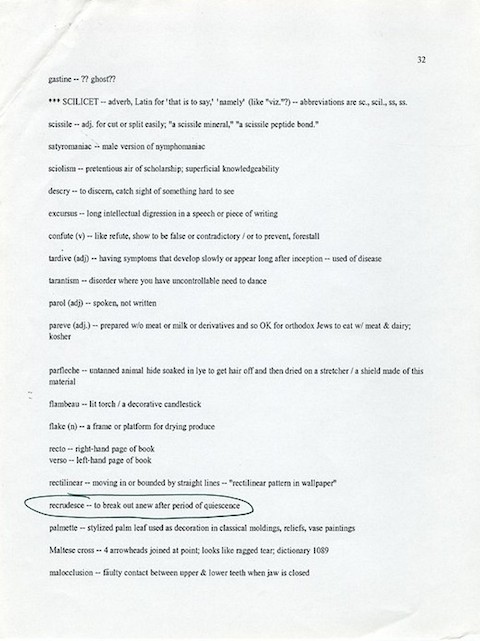Everyone I know has a list of least-favorite words. For various reasons, “moist” always seems to make the top three. But perhaps it takes a writer—someone who savors the sounds, textures, and histories of peculiar words—to compile a list of their most-favorites. A few I’ve placed in keepsake boxes over the years—little corrugated minerals that remind me of what words can do: “palaver,” “obdurate,” “crevasse,” “superfecund”….
I could go on, but it’s certainly not my list you’ve come for. You’re reading, I suspect, because you well know the consummate care and attention David Foster Wallace lavished on his prose—his reputation as a smith of endless creativity who, Alex Ross wrote in a series of McSweeney’s tributes, spent his time “keenly observing, forging acronyms, reanimating lifeless OED entries, and creating sentences that make us spit out our beer.”
Ross’s mention of the Oxford English Dictionary, that venerable repository of the vast breadth and depth of written English (sadly kept behind a paywall), helps us appreciate Wallace’s list, which features such archaic adverbs as “maugre” (“in spite of, notwithstanding”) and obscure adjectives as “lacinate” (“fringed”). Who has read, much less written, the Anglo-Saxon “ruck” (“a multitude of people mixed together”)? And while the equally rock-hard, monosyllabic “wrack” is familiar, I have not before encountered the lovely “primapara” (“woman who’s pregnant for the first time”).
Another page of Wallace’s list (above—click images to enlarge) includes such treasures as “tarantism,” a “disorder where you have an uncontrollable need to dance,” and “sciolism,” a “pretentious air of scholarship; superficial knowledgability.” While it is true that Wallace has been accused of the latter, I do not think this is a competent judgment. Instead, I would describe him with another of my favorite words—“amateur”—not at all, of course, in the sense of an unpaid or unskilled beginner, but rather, as it meant in French, a “devoted lover” of the English language.
These pages come to us from Lists of Note (and the Harry Ransom Center at UT-Austin), who writes that they are “just two pages from the hundreds of word lists he amassed over the years.” Perhaps one day we’ll see a published edition of David Foster Wallace’s favorite words. For the nonce, head on over to Lists of Note to see this minim of his lexicon transcribed.
Related Content:
David Foster Wallace’s Love of Language Revealed by the Books in His Personal Library
David Foster Wallace Breaks Down Five Common Word Usage Mistakes in English
David Foster Wallace’s 1994 Syllabus: How to Teach Serious Literature with Lightweight Books
30 Free Essays & Stories by David Foster Wallace on the Web
Josh Jones is a writer and musician based in Durham, NC. Follow him at @jdmagness



Never played rugby then, I imagine? I’ll be watching the six nations today and there will be many rucks!
thanks my bro for this post
Caveman Principles
It’s “primipara” not “primapara”. I guess like mom’s pasta course. And thanks for the post.
There exists a subculture around favorite words.
http://www.favoritewords.com/
Really? “Fantods” didn’t make the list?
Had students searching for neat and unusual words on Friday — their list included “bumfuzzle” (to confuse) and “futtock” (a curved ship’s timber.